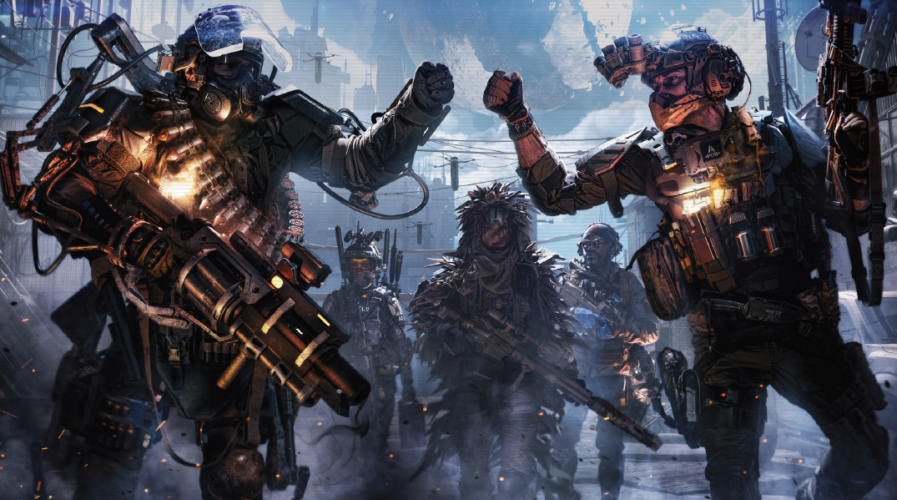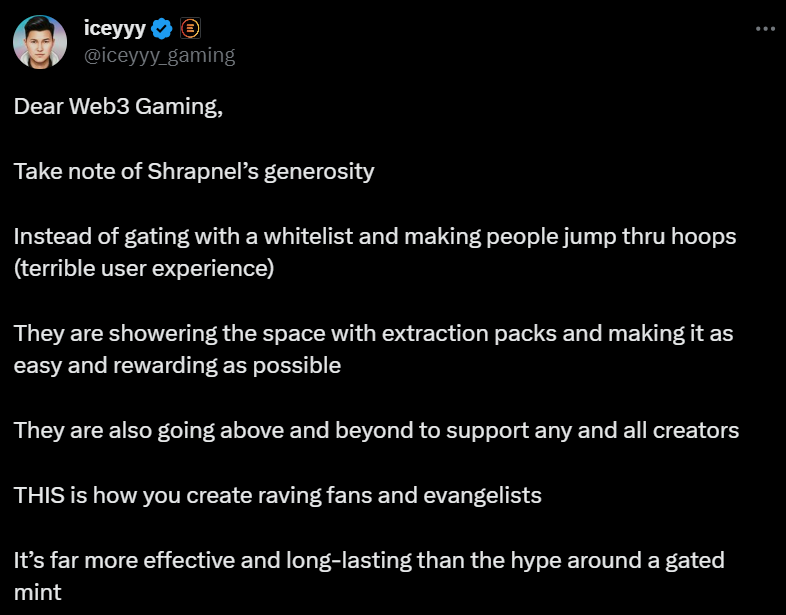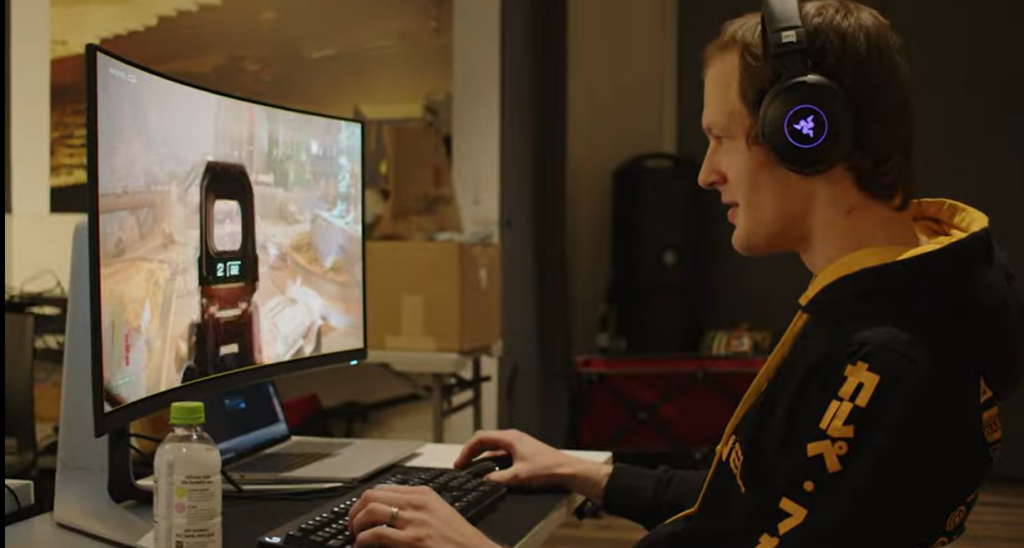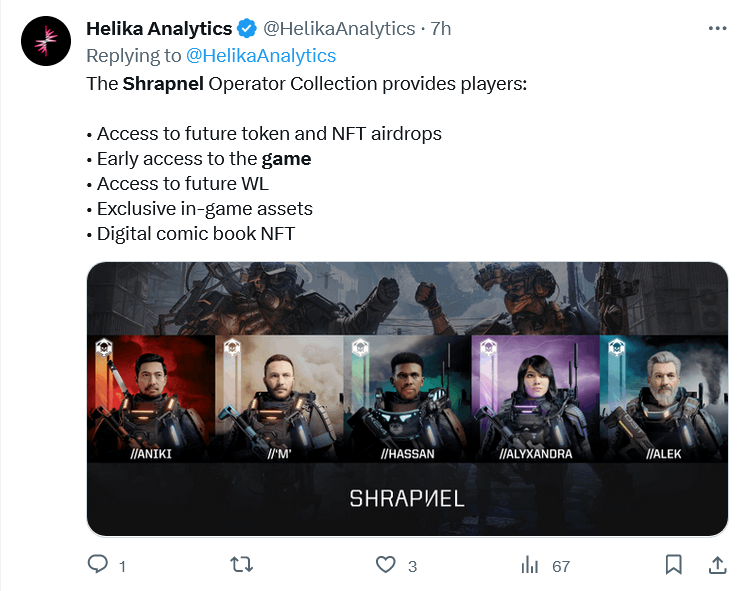
Shrapnel introduces a new era of the world’s first blockchain powered transmedia for first-person shooter games.
Shrapnel unveils a new era in first-person shooter games with transmedia storytelling using blockchain
- Shrapnel marks a revolution in new first-person shooter games with a blockchain-powered transmedia storytelling approach.
- Shrapnel merges comics, live-action shorts, and interactive gameplay for an enriched player experience.
- New first-person shooter games need not be mindless with the ability to build worlds that transmedia storytelling offers.
Transmedia storytelling is a narrative approach that tells a story across multiple platforms and media formats. It enables creators to craft more complex and immersive stories, exemplified by multiplayer games like Shrapnel. Players increasingly crave these storytelling experiences, which allow them to engage with the stories on a deeper level.
Tech Wire Asia had the opportunity to interview Marc Mercuri, chief blockchain officer at Shrapnel, for deeper insights into how transmedia storytelling extends gaming across various media platforms.
In transmedia storytelling, creators enhance experiences by allowing audiences to interact with the stories through diverse media, such as comic books or short films.
Mercuri notes that digital distribution has simplified and economized this process for Shrapnel. “Our comic books, for instance, are available in print, but we also release them as NFTs and give them out as awards. This has been a great way for audiences to connect with the content,” he added.
Shrapnel‘s innovative approach in game development and storytelling
Shrapnel‘s foray into short films, including live-action ones, has seen widespread distribution. These films have been well-received, garnering attention at film festivals and winning awards. They offer a unique opportunity to tell diverse stories within the game’s world.
Generally, the title alone excites people about games. Allowing them to further explore and engage with the game world enhances this engagement. Mercuri points out that Fortnite‘s collaboration with DC Comics featuring Batman, and Call of Duty‘s similar approach, exemplify this.
Mercuri elaborates on the lasting impact of transmedia storytelling, stating that it authentically creates awareness and attracts players more effectively than paid promotions. It fosters a deeper connection between players, the game world, and its characters, especially in first-person shooters like Shrapnel. The more players understand the game world, the more connected they feel to their characters.
“With so many things competing for our time these days, entry points vary,” Mercuri says. “You might have time to read a comic book on a flight, or watch a video while on the subway. These moments allow us to digest different aspects of stories and feel more connected to that world. Just like the games have to be fun, the stories must be engaging.”
He emphasizes that mediocre storytelling or game development won’t forge a strong connection with players. In fact, we’ve seen the cross-media narratives’ impact with Halo‘s novelizations and series by Paramount as examples of how expanded storytelling brings players closer to the game world. Assassin’s Creed‘s expansion through movies and films has similarly created engaging stories that captivate audiences.
“Moving away from that gaming genre to something like Pokémon, you’ll find an array of transmedia efforts, including great movies featuring Ryan Reynolds. In contrast, with manga, they got comics, collectibles, and cosplay,” he adds.
This approach has successfully created rich, immersive worlds for fans to explore beyond the game, allowing them to engage fully with characters and stories.
Challenges and opportunities in developing Shrapnel‘s gaming universe
For developers, however, this model presents unique challenges. Mercuri acknowledges the difficulty in managing a complex story across multiple platforms. While keeping track of different story threads is challenging, the goal is to unite them cohesively. Each story element must be accessible and contribute uniquely to the overarching narrative.
Mercuri cites game designer Neil Young’s term “additive comprehension,” which describes how each new piece of information reshapes our understanding of the fiction. Whether consumed together or separately, each element should provide a fulfilling experience, deepening the connection to the world.
Shrapnel integrates transmedia storytelling across different platforms, which presents a unique challenge. As a multiplayer first-person shooter game, Shrapnel inherently has limited opportunities to narrate its story within the game itself.
“Therefore, we’ve produced a series of comics and a collection of live-action video shorts. These pieces explore the origins of its world and the backstories of its factions and characters,” he explained. “We shot the videos on a virtual production stage, similar to the techniques used in shows like The Mandalorian.”

Shrapnel integrating virtual production stage similar to The Mandalorian. (Source – Shutterstock)
Mercuri believes Shrapnel is pioneering in using actual game assets and the Unreal Engine for production. The game’s assets are brought into the production, blending the characters’ on-stage actions with the game’s world displayed on the screen. It’s not just an approximation of the game; it is the game, which is an innovative approach.
Using blockchain technology in the new era of first-person shooter games
Shrapnel‘s use of blockchain technology in creating the world’s first blockchain-powered transmedia first-person shooter game is notable. Mercuri shared insights into how this integration plays a crucial role in the company’s strategy.
In Shrapnel‘s near-term future setting, asteroid mining is common. As many sci-fi narratives suggest, things often go wrong. A collision with the moon has led to asteroids, termed ‘Shrapnel,’ raining down on Earth. This event has given rise to ‘sacrifice zones’ where a unique material called sigma is found. People venture into these zones to collect sigma and sell it to interested families.
Shrapnel‘s game uses blockchain primarily to empower creators. Players can create and sell stickers, skins, and other items for characters and weapons within their profiles.
“We’ve enabled the combination and remixing of these assets, termed ‘Insignias,'” Mercuri said. “If someone creates something exceptional from our work, we can also benefit from it. Our goal is to have assets that can be created, sold, and include embedded royalties to compensate the creators.”
He discussed another common scenario where players purchase various in-game items. Typically, these assets are non-transferable, locked within the game. Some players even resort to selling their accounts. However, in Shrapnel, players have complete ownership of their assets, allowing for free trading.
Shrapnel‘s assets are designed to be ‘bridgeable,’ meaning they can be transferred across different blockchains. This flexibility is vital, as players may choose to use their assets on other chains, possibly as collateral for loans. Shrapnel incorporates innovative blockchain features to support this functionality, something which has not been available in new first-person shooter games before.
Additionally, Shrapnel is developing the GameBridge platform, which aims to simplify blockchain item composability and interoperability. This platform allows the integration of Shrapnel‘s features into other platforms. “The game world we’ve created incorporates elements of finance, commerce, manufacturing, and supply chain management. Despite this complexity, the blockchain component is seamless and unobtrusive to the gaming experience,” Mercuri emphasized, comparing it to the unnoticed TCPIP protocol in multiplayer games.
A unique feature of Shrapnel‘s game is its extraction shooter format, where the stakes are real. Players can create, trade, and in-game, claim items from other players. Successfully extracting these items allows players to keep, sell, or trade them, adding a thrilling layer to the gameplay.

An X user explains how Shrapnel is supporting creators. (Source – X)
Data security is always a factor for any new first-person shooter games
In the context of data security and user privacy, balancing innovative technology like blockchain with the imperative of safeguarding user data is crucial.
Mercuri reflects on the importance of trust, noting that it takes a lifetime to earn but only a moment to lose. Treating privacy and security as paramount is essential, particularly when handling assets that players can own and trade.
He recounted his experience leading the blockchain business at Microsoft, emphasizing the permanence of blockchain transactions. “We’ve implemented multiple layers of security, drawing on our experience working with some of the world’s most security-conscious companies,” Mercuri said. This approach uses the insights gained from thousands of hours spent with top IT professionals globally.
We also explored concerns surrounding not just blockchain, but also generative AI in terms of security. When it comes to influencing developers, especially in integrating it into game development, balancing security is crucial. This is particularly important, considering the code generated by AI platforms can sometimes be incorrect. It’s essential to know when to use it and when not to, especially for a game like Shrapnel.
One challenge with generative AI is the confidence in its output, whether correct or incorrect. In coding, it depends on what you ask it to do and how you structure the prompts. For instance, writing code for a specific task is usually divided into several steps. Some of these may be commodity code—standard and time-consuming—while others could be more innovative and require problem-solving.

The challenge with developers in coding a game. (Source – X)
Generative AI can significantly expedite the process of writing commodity code. However, while AI can provide a general direction for new challenges, its solutions are not always 100% accurate. Current AI models perform well for most tasks, including smart contracts, although Shrapnel does not utilize them.
“The key is not to unquestioningly accept AI-generated code,” said Mercuri. “We conduct thorough testing, including integration tests, to ensure functionality. In my experience, generative AI can save considerable time when used judiciously, allowing us to focus on the creative aspects of game development.”
In the gaming industry, the focus is on nurturing innovative ideas. Automating routine coding tasks frees up resources to add value to the game, creating exciting and engaging experiences for players following Shrapnel‘s transmedia content and anticipating new developments.
Future trends: blending gaming and cinematic narratives
Looking ahead, Mercuri shared his and Mark Long’s (CEO of Shrapnel) excitement about recent adaptations of games like The Last of Us and Sonic. Reflecting on the original Super Mario Brothers movie, they note it likely wasn’t made by those who grew up loving the game. Today, however, we see big-screen stories told by people who have deeply engaged with these games for hours, and this passion is evident in the storytelling.

First-person shooter games will be different post-Shrapnel.
Previously, game adaptations seemed more driven by financial opportunity than passion. They were often made because arcade games were popular among children. Now, these film adaptations are passion projects, crafted by those eager to tell great stories and reach a wider audience.
As Shrapnel continues to push the limits of what’s possible in gaming, it stands as a beacon for future developments, promising a landscape where gaming, storytelling, and technology converge to create experiences that are as enriching as they are entertaining. With its innovative approach and forward-thinking vision, Shrapnel is poised to redefine the gaming experience for players of new first-person shooter games around the world.
READ MORE
- Safer Automation: How Sophic and Firmus Succeeded in Malaysia with MDEC’s Support
- Privilege granted, not gained: Intelligent authorization for enhanced infrastructure productivity
- Low-Code produces the Proof-of-Possibilities
- New Wearables Enable Staff to Work Faster and Safer
- Experts weigh in on Oracle’s departure from adland




